May 17, 2025 | 03:40 GMT +7
May 17, 2025 | 03:40 GMT +7
Hotline: 0913.378.918
May 17, 2025 | 03:40 GMT +7
Hotline: 0913.378.918
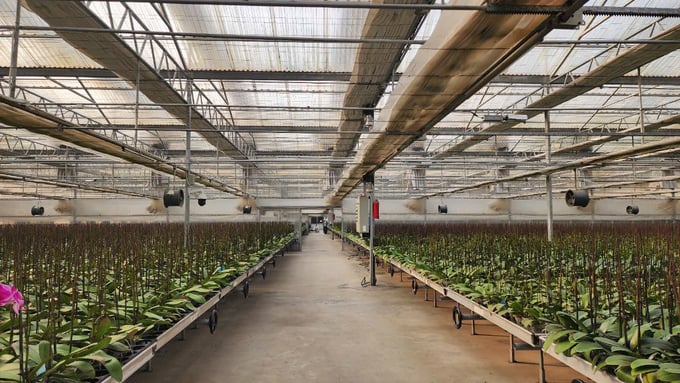
The high-tech orchid farm belonging to Chau Giang Company. Photo: Dinh Muoi.
Dao Quang Trinh, Director of Chau Giang Agricultural Co., Ltd. in Hai Phong City, made a remarkable shift from traditional agriculture to high-tech Phalaenopsis orchid cultivation. With a strong determination to adjust his approach, Trinh has achieved notable success by making substantial investments in technology.
Phalaenopsis orchids thrive in cool environments, with an ideal temperature range of 15 to 25 degrees Celsius. Namely, these temperatures encourage the growth of spikes, thereby ensuring that the flowers bloom at desired times. Furthermore, a temperature range of 20 to 25 degrees Celsius is optimal for healthy growth, budding, and full blooms.
The biggest challenge for orchid cultivation in northern Vietnam is the electricity costs associated with air conditioning systems in the flower farms. Each orchid requires two months of cooling during its flowering phase, consuming roughly 3,000 to 4,000 VND in electricity per plant. As a result, Chau Giang Company primarily targets the Lunar New Year market, as the excessive electricity costs during other months severely affect profitability.
The company's production process incorporates advanced agricultural technology from Israel and automated greenhouse control systems. These systems feature temperature regulation and ventilation, temperature sensors, water filtration, and automated irrigation. The company spends between approximately 35 and 40 billion VND for each hectare of cultivation area.
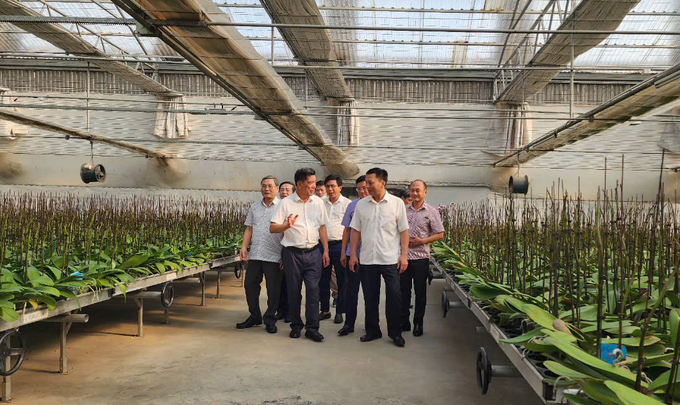
Dao Quang Trinh introducing his orchid farm to provincial agricultural representatives visiting Hai Phong. Photo: Dinh Muoi.
"We received a small amount of funding and policy support from the province's Departments of Agriculture and Science and Technology; however, they served only as a starting incentive. Orchid farmers must secure substantial capital reserves in order to operate their farms effectively. For example, we spent over 150 billion VND in construction costs for our orchid farm," Trinh shared.
According to Trinh, Phalaenopsis orchid farming has achieved relative success in Vietnam. Nevertheless, the industry faces considerable challenges in the tissue culturing process, which largely depends on foreign technology. Despite the pace of development in Vietnam's agricultural sector, orchid farming is currently in its infancy. Consequently, the industry requires an additional 5 to 10 years to gather experience and improve product quality.
Trinh believes that Phalaenopsis orchid cultivation can generate substantial annual profits, which can surpass that of traditional farming. Consequently, Phalaenopsis orchid farming will allow local farmers to develop and benefit from high income levels in the future. However, additional policy and regulatory support is essential. Moreover, local governments must develop plans and organize high-tech agricultural development to prevent oversupply and sales challenges.
According to the local Agricultural Extension Center, Chau Giang Company’s Phalaenopsis orchid farm was implemented under Resolution No. 14 with the aim of promoting high-tech agricultural development in Hai Phong.

An orchid farm in the flowering stage in preparation for the Lunar New Year holiday. Photo: Dinh Muoi.
Trinh's one-hectare orchid farming model initially received technical support from the local Departments of Agriculture and Science and Technology, focusing first on melon and gerbera daisy cultivation. However, after research and trials, Dao Quang Trinh decided to pivot to Phalaenopsis orchid farming to utilize the market potential of this flower species.
In the first few years, the Hai Phong Agricultural Extension Center supported the company by assigning two specialized agricultural technicians directly to the farm. This support helped Trinh establish a strong foundation in Phalaenopsis production.
With persistent effort, Chau Giang Company's greenhouse orchid farming model has expanded from two to three hectares. The company employs advanced Israeli agricultural technology, equipped with automated greenhouse systems. These systems feature temperature regulation and ventilation, temperature sensors, water filtration, and automated irrigation.
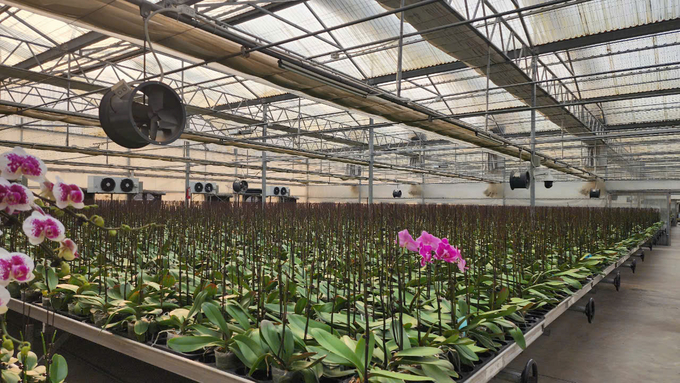
The orchid farm houses 600,000 flowers in 80 different color varieties. Photo: Dinh Muoi.
Chau Giang Company currently manages 600,000 orchid plants, including both seedlings and market-ready flowering orchids. The blooming orchids are available in a range of 80 vibrant colors.
A portion of the seedlings are nurtured to bloom in time for the Lunar New Year market. These vibrant Phalaenopsis orchids, priced between 90,000 and 120,000 VND per plant, are sold either as individual plants or in potted arrangements to meet varied customer preferences.
In recent years, Chau Giang Company and other businesses in Hai Phong have received support from the government to develop high-tech orchid farming models. Chau Giang's high-tech Phalaenopsis model has yielded significant profits, with potential for replication across Hai Phong and other regions in Vietnam. This model exemplifies the successful combination of flexible government support, innovation, and the entrepreneurial spirit to undertake significant investments.
Chau Giang acquires high-quality imported materials from China and Taiwan. Seedlings, imported as tissue cultures, are cultivated in a controlled environment and subsequently propagated to supply orchid farms in Da Lat, Thanh Hoa, Lai Chau, and Lao Cai, among others. These seedlings can fetch prices ranging from 30,000 to 80,000 VND per plant, depending on age, color, and quantity.
Translated by Nguyen Hai Long

(VAN) Vietnam’s TH Group officially put its high-tech fresh milk processing plant into operation in the Russian Federation, marking a historic moment as the first TH true MILK cartons were produced in Russia.

(VAN) Use of high-quality broodstock and biotechnology is regarded as the most effective approach to ensuring sustainable and economically viable shrimp aquaculture ahead of climate change and the emergence of increasingly intricate disease patterns.

(VAN) Carbon farming is a form of agricultural practices that helps absorb more greenhouse gases than it emits, through smart management of soil, crops, and livestock.

(VAN) This is a key content of the Memorandum of Understanding recently signed between the Vietnam Fisheries Society and Kunihiro Inc of Japan.

(VAN) To achieve the goal, local authorities and businesses in Kon Tum province have fully prepared the necessary conditions for the new Ngoc Linh ginseng planting season.
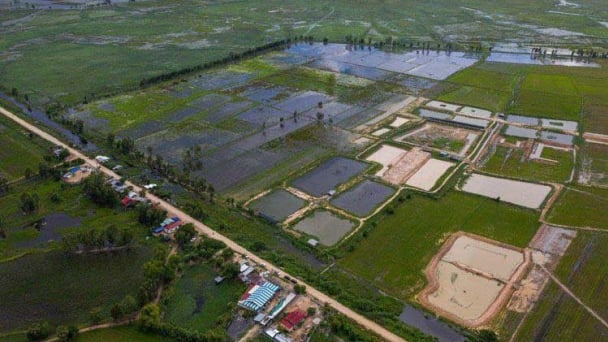
(VAN) Jiangsu province is gearing up to host training programs in Phnom Penh, the capital of Cambodia, this year to establish the Fish and Rice Corridor.
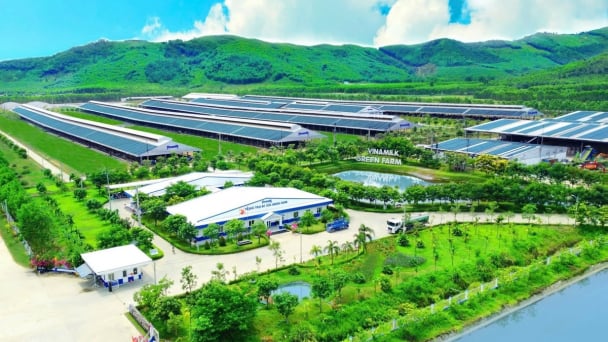
(VAN) Le Hoang Minh, representing Vinamilk, shared the company's experience in energy saving and green energy transition for production at a workshop held during the P4G Summit.